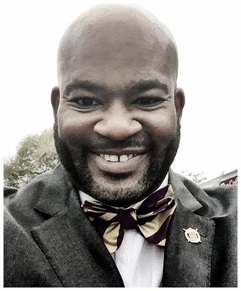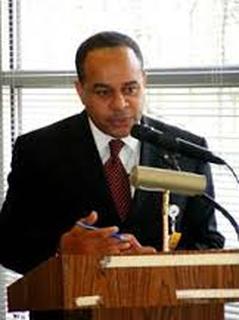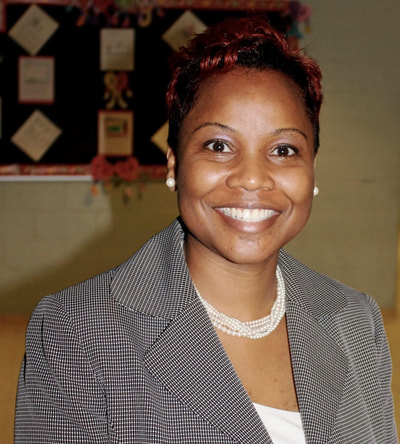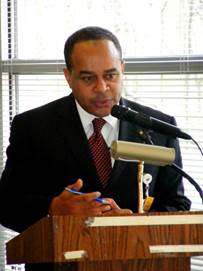African American Males
Scroll below to select research from the following scholars

Dr. Olajide Bamishigbin Jr.
Title: Health Psychologist and an Assistant Professor of Psychology at California State University, Long Beach.
Research Topic: The Antecedents and Consequences of Adolescent Fatherhood in Black Males
Institution: University of California, Los Angeles (UCLA)
Committee Chair: Dr. Annette L. Stanton and Dr. Christine Dunkel Schetter
Abstract: Nearly 11 million adolescent fathers between the ages of 15 and 44 live in the United States. Adolescent fathers are stereotyped as reckless teenagers and uninvolved parents. However, little research has examined the veracity of these negative perceptions about adolescent fathers. The goals of the current two-study dissertation were to (a) systematically review the published peer-reviewed literature on the antecedents and consequences of adolescent fatherhood and (b) test hypothesized antecedents of adolescent fatherhood in a sample of Black males.
Results from the systematic review indicated that the adolescents at greater risk of becoming adolescent fathers (i.e., antecedents) are more likely to be Black or Latino and come from low socioeconomic status backgrounds as characterized by lower parental education and income. Adolescent fathers are also more likely to come from low socioeconomic status iii neighborhoods, engage in delinquent behavior and substance use, have lower academic competence, and have peers who engage in deviant behaviors. With regard to consequences, findings demonstrated that the offspring of adolescent fathers are at greater risk for adverse birth outcomes and the children of adolescent fathers are at greater risk for psychological disorders.
Findings from Study 2 demonstrated that over and above other hypothesized individual antecedents, Black male adolescents who engaged in sexual intercourse prior to the age of 15 were three times more likely to become adolescent fathers than adolescents who waited until they were older than the age of 15. Adolescents with mothers who would be more disappointed if they completed college were also less likely to become adolescent fathers, over and above other familial antecedents (e.g., maternal educational attainment, maternal disapproval of sex). Univariate analyses also demonstrated that adolescents who engaged in more delinquent behavior and who had lower educational aspirations were more likely to become adolescent fathers.
Findings from these two studies contribute to our understanding of the adolescents most at-risk of becoming fathers as teens as well as the problems they face as young parents. These findings can guide future research on adolescent fathers and potentially the development of interventions to prevent adolescent fatherhood and to assist adolescents who do become fathers.
Title: Health Psychologist and an Assistant Professor of Psychology at California State University, Long Beach.
Research Topic: The Antecedents and Consequences of Adolescent Fatherhood in Black Males
Institution: University of California, Los Angeles (UCLA)
Committee Chair: Dr. Annette L. Stanton and Dr. Christine Dunkel Schetter
Abstract: Nearly 11 million adolescent fathers between the ages of 15 and 44 live in the United States. Adolescent fathers are stereotyped as reckless teenagers and uninvolved parents. However, little research has examined the veracity of these negative perceptions about adolescent fathers. The goals of the current two-study dissertation were to (a) systematically review the published peer-reviewed literature on the antecedents and consequences of adolescent fatherhood and (b) test hypothesized antecedents of adolescent fatherhood in a sample of Black males.
Results from the systematic review indicated that the adolescents at greater risk of becoming adolescent fathers (i.e., antecedents) are more likely to be Black or Latino and come from low socioeconomic status backgrounds as characterized by lower parental education and income. Adolescent fathers are also more likely to come from low socioeconomic status iii neighborhoods, engage in delinquent behavior and substance use, have lower academic competence, and have peers who engage in deviant behaviors. With regard to consequences, findings demonstrated that the offspring of adolescent fathers are at greater risk for adverse birth outcomes and the children of adolescent fathers are at greater risk for psychological disorders.
Findings from Study 2 demonstrated that over and above other hypothesized individual antecedents, Black male adolescents who engaged in sexual intercourse prior to the age of 15 were three times more likely to become adolescent fathers than adolescents who waited until they were older than the age of 15. Adolescents with mothers who would be more disappointed if they completed college were also less likely to become adolescent fathers, over and above other familial antecedents (e.g., maternal educational attainment, maternal disapproval of sex). Univariate analyses also demonstrated that adolescents who engaged in more delinquent behavior and who had lower educational aspirations were more likely to become adolescent fathers.
Findings from these two studies contribute to our understanding of the adolescents most at-risk of becoming fathers as teens as well as the problems they face as young parents. These findings can guide future research on adolescent fathers and potentially the development of interventions to prevent adolescent fatherhood and to assist adolescents who do become fathers.
| escholarship_uc_item_7h1036nm.pdf | |
| File Size: | 1125 kb |
| File Type: | |
 @DionneCspeaks
@DionneCspeaks
Dr. Dionne Cowan
Title: Associate Director, Principals Center (George State University)
Research Topic: Men of Color Evading the School to Prison Pipeline: A Phenomenological Study Championing Justice
Institution: Georgia State University
Committee Chair: Dr. Janice Fournillier
Abstract: The school to prison pipeline (STPP) is a conceptual framework reflecting the injustice that bleeds at the intersection of the educational and criminal justice systems. By drawing on research from a variety of disciplines – including education, psychology, and law – the review of literature examined the contextual factors, including zero tolerance policy and practice, impacting the STPP. The purpose of this phenomenological study was to examine the lived experiences of six men of color and their ability to evade the STPP. More specifically, this dissertation investigated to what capacity the leadership in the home, community, and school contributed to the six men’s ability to evade the grip of the STPP. Constructionism and critical inquiry framed this research that adopted a phenomenological approach. Using their voice and perspectives, the research portrays the men’s lived experience. It is hoped that these narratives can provide educational leaders and the larger society insight into how the six men successfully navigated the K-12 educational system. The key findings pinpoint the structures of support within the context of the home, community, and school that champion justice, success, and equity for boys and young men of color. This study reveals that there is a need for: policy and practice reformation, a closer investigation of restorative justice, demonstration of culturally relevant leadership, and a call for justice.
Title: Associate Director, Principals Center (George State University)
Research Topic: Men of Color Evading the School to Prison Pipeline: A Phenomenological Study Championing Justice
Institution: Georgia State University
Committee Chair: Dr. Janice Fournillier
Abstract: The school to prison pipeline (STPP) is a conceptual framework reflecting the injustice that bleeds at the intersection of the educational and criminal justice systems. By drawing on research from a variety of disciplines – including education, psychology, and law – the review of literature examined the contextual factors, including zero tolerance policy and practice, impacting the STPP. The purpose of this phenomenological study was to examine the lived experiences of six men of color and their ability to evade the STPP. More specifically, this dissertation investigated to what capacity the leadership in the home, community, and school contributed to the six men’s ability to evade the grip of the STPP. Constructionism and critical inquiry framed this research that adopted a phenomenological approach. Using their voice and perspectives, the research portrays the men’s lived experience. It is hoped that these narratives can provide educational leaders and the larger society insight into how the six men successfully navigated the K-12 educational system. The key findings pinpoint the structures of support within the context of the home, community, and school that champion justice, success, and equity for boys and young men of color. This study reveals that there is a need for: policy and practice reformation, a closer investigation of restorative justice, demonstration of culturally relevant leadership, and a call for justice.
| men_of_color_evading_the_school_to_prison_pipeline__a_phenomenolo.pdf | |
| File Size: | 1608 kb |
| File Type: | |
 @consultingDCH
@consultingDCH
Dr. Dorothy C. Handfield
Title: Founder and CEO, DCH Consulting
Research Topic: In-School Violent Behavior Impacts Future Goals for Low Socioeconomic Status Black Male Students who were Exposed to Community Violence
Institution: University of Southern California
Committee Chair: Dr. Jenifer Crawford
Abstract: This research study evaluated the modified gap analysis of knowledge and skills, motivation, and organization on how low socioeconomic status (SES) Black male students who were exposed to community violence and participated in Our Kids, a pseudonym for a non-profit community-based organization that provides extracurricular programs to at-risk males. The purpose of this study is to understand how the in-school violent behavior of low SES Black males affects these students’ abilities to realize future goals. Using the Clark and Estes (2008) gap analysis, the collection of data from interviews and documents identified and validated the source of the students’ performance gaps. Findings revealed that the urban school district had positive and negative aspects in its current program that addressed students’ in-school violent behavior. Overall, the findings exposed that the students in the study had procedural knowledge, knowledge of self-regulation and support their increase in knowledge of self-identity even though the documents exposed that Black male students may lack self-regulation. The students had self-efficacy and students’ emotions influence their motivation. The students believe that there is racial equities and opportunities to build trusting relationships, but urban school district created a threatening environment. Yet, the documents show racial inequities. This research study recommends research-based solutions to assist organizations in decreasing in-school violent behavior. Finally, Our Kids can utilize the modified gap analysis model to identify and validate causes of performance gaps and recommend solutions.
Title: Founder and CEO, DCH Consulting
Research Topic: In-School Violent Behavior Impacts Future Goals for Low Socioeconomic Status Black Male Students who were Exposed to Community Violence
Institution: University of Southern California
Committee Chair: Dr. Jenifer Crawford
Abstract: This research study evaluated the modified gap analysis of knowledge and skills, motivation, and organization on how low socioeconomic status (SES) Black male students who were exposed to community violence and participated in Our Kids, a pseudonym for a non-profit community-based organization that provides extracurricular programs to at-risk males. The purpose of this study is to understand how the in-school violent behavior of low SES Black males affects these students’ abilities to realize future goals. Using the Clark and Estes (2008) gap analysis, the collection of data from interviews and documents identified and validated the source of the students’ performance gaps. Findings revealed that the urban school district had positive and negative aspects in its current program that addressed students’ in-school violent behavior. Overall, the findings exposed that the students in the study had procedural knowledge, knowledge of self-regulation and support their increase in knowledge of self-identity even though the documents exposed that Black male students may lack self-regulation. The students had self-efficacy and students’ emotions influence their motivation. The students believe that there is racial equities and opportunities to build trusting relationships, but urban school district created a threatening environment. Yet, the documents show racial inequities. This research study recommends research-based solutions to assist organizations in decreasing in-school violent behavior. Finally, Our Kids can utilize the modified gap analysis model to identify and validate causes of performance gaps and recommend solutions.
| handfield_dorothy_dissertation__2_.pdf | |
| File Size: | 1212 kb |
| File Type: | |
 @manetho06
@manetho06
Dr. Dwayne Ham
Title: Certified as a Principal/Assistant Principal
Research: The Relationship of Student Engagement, Student Motivation, and Peer Victimization Among African American Males
Institution: Bowie State University
Committee Chair: Dr. Winona Taylor
Abstract: The interpersonal relationship among African American males is an important factor when examining their perseverance. This research study investigated the relationship of student engagement, student motivation and peer victimization among black boys in elementary, middle and high school using Merton’s analysis of deviant behaviors. The sample was taken from one high school and two elementary and middle schools in the Mid-Atlantic of the United States consisting of 191 students. The results of the study revealed that Student engagement and peer victimization are significant inverse relationships of each other and that student motivation and peer victimization are also significant inverse relationships as well. In addition, father was a significant predictor of student engagement and student motivation among African American males in high school.
Title: Certified as a Principal/Assistant Principal
Research: The Relationship of Student Engagement, Student Motivation, and Peer Victimization Among African American Males
Institution: Bowie State University
Committee Chair: Dr. Winona Taylor
Abstract: The interpersonal relationship among African American males is an important factor when examining their perseverance. This research study investigated the relationship of student engagement, student motivation and peer victimization among black boys in elementary, middle and high school using Merton’s analysis of deviant behaviors. The sample was taken from one high school and two elementary and middle schools in the Mid-Atlantic of the United States consisting of 191 students. The results of the study revealed that Student engagement and peer victimization are significant inverse relationships of each other and that student motivation and peer victimization are also significant inverse relationships as well. In addition, father was a significant predictor of student engagement and student motivation among African American males in high school.
| dwaynesdissertation.pdf | |
| File Size: | 662 kb |
| File Type: | |
 @stephengpeters
@stephengpeters
Dr. Stephen Peters
Title: Author/Speaker/Superintendent Laurens School District 55 / ILA Board of Directors
Research Topic: Impact of The Gentlemen’s Club on School Attendance, Behavior, and Academic Achievement of African-American Male Participants in Five U.S. School Districts
Institution: South Carolina State University
Abstract: School districts are grappling with the problem of an alarming number of African-American males who are underperforming in our nation’s schools. “On all indicators of academic achievement, educational attainment, and school success, African-American males are noticeably distinguished from other segments of the American population by their consistent clustering at the bottom and do not realize their full potential (Schott, 2010).” A number of reports and studies, including the Council of the Great City Schools’ report—A Call for Change: The Social and Educational Factors Contributing to the Outcomes of Black Males in Urban Schools (Aug. 2012), indicate that “too often our schools have not served these students well.” With few exceptions, these dismal patterns exist in urban, suburban, and rural school districts throughout the United States (Peters, 2006). The Gentlemen’s Club (GC) program integrates Bronfenbrenner’s Ecological Systems Model (1979) of child development with a culturally responsive design to engage African-American males with culturally sensitive pedagogical strategies to meet their holistic needs. Using a single-gender platform, the after-school program focuses on issues facing this targeted population with the intention of addressing educational issues of African-American males by taking a cognitive-based approach to changing thinking through a field- tested GC curriculum, in order to change behavior and improve low academic achievement, poor attendance, and behavioral issues. The underlying premise of GC is that “you cannot teach students you don’t know” (Peters, 2010).
Title: Author/Speaker/Superintendent Laurens School District 55 / ILA Board of Directors
Research Topic: Impact of The Gentlemen’s Club on School Attendance, Behavior, and Academic Achievement of African-American Male Participants in Five U.S. School Districts
Institution: South Carolina State University
Abstract: School districts are grappling with the problem of an alarming number of African-American males who are underperforming in our nation’s schools. “On all indicators of academic achievement, educational attainment, and school success, African-American males are noticeably distinguished from other segments of the American population by their consistent clustering at the bottom and do not realize their full potential (Schott, 2010).” A number of reports and studies, including the Council of the Great City Schools’ report—A Call for Change: The Social and Educational Factors Contributing to the Outcomes of Black Males in Urban Schools (Aug. 2012), indicate that “too often our schools have not served these students well.” With few exceptions, these dismal patterns exist in urban, suburban, and rural school districts throughout the United States (Peters, 2006). The Gentlemen’s Club (GC) program integrates Bronfenbrenner’s Ecological Systems Model (1979) of child development with a culturally responsive design to engage African-American males with culturally sensitive pedagogical strategies to meet their holistic needs. Using a single-gender platform, the after-school program focuses on issues facing this targeted population with the intention of addressing educational issues of African-American males by taking a cognitive-based approach to changing thinking through a field- tested GC curriculum, in order to change behavior and improve low academic achievement, poor attendance, and behavioral issues. The underlying premise of GC is that “you cannot teach students you don’t know” (Peters, 2010).
| petersdissertation2014.pdf | |
| File Size: | 1054 kb |
| File Type: | |
 @sweetconusa
@sweetconusa
Dr. Lana Walton
Title: CEO Sweet ConsultingUSA.com
Research Topic: How African American Males Perceive Their High School Experience
Institution:University of Redlands
Committee Chair: Ron Morgan, Ph.D.
Abstract: A major concern for public schools and society in general is retention of African American males. Studies show that African American males are at the bottom of the achievement gap, and have the highest dropout rates of any group of students. Consequently, the public school system has been accused of failing them. This study examined the perceived high school experiences of these individuals, and their relationships with educators. The goal was to gain insight into this issue and to help solve the problem.Ten participants were taken from a diverse socio-economic class at a large, Southern California faith based institution. They were selected through Snowballing methods and volunteering. The majority fell between ages sixteen and seventeen, one was eighteen years old, and all were African American males. They all attended comprehensive high schools in Southern, California, came from diverse cities, schools, and school districts.Themes that emerged found that school, teachers, and school work were more accommodating elementary through middle school. The majority of participants attributed the high percentage of school dropout to bad student/teacher relationships. Minor divergence occurred between peer pressure, boredom, failing grades, gangs, and home environment. Most participants reported getting more support for career goals from coaches as compared to teachers and counselors.
Title: CEO Sweet ConsultingUSA.com
Research Topic: How African American Males Perceive Their High School Experience
Institution:University of Redlands
Committee Chair: Ron Morgan, Ph.D.
Abstract: A major concern for public schools and society in general is retention of African American males. Studies show that African American males are at the bottom of the achievement gap, and have the highest dropout rates of any group of students. Consequently, the public school system has been accused of failing them. This study examined the perceived high school experiences of these individuals, and their relationships with educators. The goal was to gain insight into this issue and to help solve the problem.Ten participants were taken from a diverse socio-economic class at a large, Southern California faith based institution. They were selected through Snowballing methods and volunteering. The majority fell between ages sixteen and seventeen, one was eighteen years old, and all were African American males. They all attended comprehensive high schools in Southern, California, came from diverse cities, schools, and school districts.Themes that emerged found that school, teachers, and school work were more accommodating elementary through middle school. The majority of participants attributed the high percentage of school dropout to bad student/teacher relationships. Minor divergence occurred between peer pressure, boredom, failing grades, gangs, and home environment. Most participants reported getting more support for career goals from coaches as compared to teachers and counselors.
| out.pdf | |
| File Size: | 926 kb |
| File Type: | |
 @88Que
@88Que
Dr. Kyle R. Bacon
Title: 8th Grade Math Teacher, Maryland Public Schools
Research Topic: Academic Motivation And Success: A Phenomenological Study of 8th Grade African American Boys in Two Suburban Maryland Middle Schools
Institution: University of Maryland Eastern Shore (Educational Leadership Program)
Committee Chair: Dr. Derry Stuff
Abstract: A review of the existing literature illuminated a gap in the current research on academic motivation and success for 8th grade African American male students in the state of Maryland. The purpose of this phenomenological study was to understand the perceptions of factors contributing to the academic motivation and success of eight 8th grade African America male students’ in two suburban Maryland middle schools. From the research, eight major themes emerged from the study; goal setting, highly academic performance, increased peer accountability, parental support and accountability, classroom environment, more principal-led focus groups, specific career aspirations, and negative school images. Based on the themes the researcher collected, the results suggested that peer accountability, parental involvement, and committed educators have a direct correlation with the academic motivation and success of the selected participants. The research may be of interest to K–12 administrators, teachers, and parents seeking instructional and cognitive strategies to address how 8th grade African American male students process their perceptions and emotions attached to their learning.
Title: 8th Grade Math Teacher, Maryland Public Schools
Research Topic: Academic Motivation And Success: A Phenomenological Study of 8th Grade African American Boys in Two Suburban Maryland Middle Schools
Institution: University of Maryland Eastern Shore (Educational Leadership Program)
Committee Chair: Dr. Derry Stuff
Abstract: A review of the existing literature illuminated a gap in the current research on academic motivation and success for 8th grade African American male students in the state of Maryland. The purpose of this phenomenological study was to understand the perceptions of factors contributing to the academic motivation and success of eight 8th grade African America male students’ in two suburban Maryland middle schools. From the research, eight major themes emerged from the study; goal setting, highly academic performance, increased peer accountability, parental support and accountability, classroom environment, more principal-led focus groups, specific career aspirations, and negative school images. Based on the themes the researcher collected, the results suggested that peer accountability, parental involvement, and committed educators have a direct correlation with the academic motivation and success of the selected participants. The research may be of interest to K–12 administrators, teachers, and parents seeking instructional and cognitive strategies to address how 8th grade African American male students process their perceptions and emotions attached to their learning.
| kyle_bacon_dissertation.pdf | |
| File Size: | 1600 kb |
| File Type: | |
 @rmurphy452
@rmurphy452
Dr. Robert L. Murphy
Title: CEO at The Masters Preparatory Academy
Research Topic: Saving Our Sons: The Impact of a Single Gender Public School on the Social, Emotional and Academic Progress of Young African American Males from Low Socioeconomic Urban Neighborhoods
Committee Chair: Dr. Dwan V. Robinson
Institution: The Patton College of Education of Ohio University
Abstract: African American males consistently perform at significantly lower academic levels, than their peers, at every age level and on almost every national assessment (Lewis, Simon, Uzzell, Horwitz, & Casserly, 2010; Harvey, 2010; Tsoi-A-Fatt, 2010; Fergus & Noguera, 2010), and of all racial/ethnic and gender groups, African American males continue to be the least likely to secure a regular high school diploma in four years (Schott Foundation, 2012). Their lack of educational progress increases the likelihood that many of them will not live productive and meaningful lives, and they will be trapped in a continuous cycle of poverty. Because of the technical skills required to be employable in the 21st century workforce, getting a quality education may be more critical now, than in years past (Jackson & Moore, 2006).
Too many of the African American male students in several of the coeducational public schools within the urban centers of the United States are not achieving academically. It is the researcher’s opinion that many of the coeducational public schools, in large urban cities, are not meeting the social and emotional needs of their African American males, which greatly contributes to the low academic performance of these students. If this nation is truly serious about ameliorating the educational problems of these members of our society, we need to examine, and adopt educational alternatives to these schools that have historically not met their needs.
This qualitative study will examine the impact of single gender public schools on the educational progress of young, low-income African American males. The specific aim of this inquiry is to add to the limited, but growing collection of theories and research about single gender public schools and to critically examine how these single gender public schools affect the social, emotional, and academic progress of young, low-income African American males. This study will focus on the perceptions and experiences of young, low-income, African American males who attend a single gender public school; perceptions and experiences of their parents and/or guardians; and the perceptions and experiences of their teachers and administrator. Specifically, this study will focus on what the single gender public school is doing to develop a school culture designed to address the social, emotional, and academic needs of these young, low-income, African American males.
The researcher designed and conducted a pilot study to explore the complexities of the research process. The participants of the pilot study were six African American male students, their parents/guardians, three of their teachers, and their administrator.
The pilot study was conducted at The Leaders Academy, an all African American male, public high school located in a large Midwestern city. The Leaders Academy also served as the site for the final study, which will focus on four students, their parents/guardians, three teachers, and the principal.
Title: CEO at The Masters Preparatory Academy
Research Topic: Saving Our Sons: The Impact of a Single Gender Public School on the Social, Emotional and Academic Progress of Young African American Males from Low Socioeconomic Urban Neighborhoods
Committee Chair: Dr. Dwan V. Robinson
Institution: The Patton College of Education of Ohio University
Abstract: African American males consistently perform at significantly lower academic levels, than their peers, at every age level and on almost every national assessment (Lewis, Simon, Uzzell, Horwitz, & Casserly, 2010; Harvey, 2010; Tsoi-A-Fatt, 2010; Fergus & Noguera, 2010), and of all racial/ethnic and gender groups, African American males continue to be the least likely to secure a regular high school diploma in four years (Schott Foundation, 2012). Their lack of educational progress increases the likelihood that many of them will not live productive and meaningful lives, and they will be trapped in a continuous cycle of poverty. Because of the technical skills required to be employable in the 21st century workforce, getting a quality education may be more critical now, than in years past (Jackson & Moore, 2006).
Too many of the African American male students in several of the coeducational public schools within the urban centers of the United States are not achieving academically. It is the researcher’s opinion that many of the coeducational public schools, in large urban cities, are not meeting the social and emotional needs of their African American males, which greatly contributes to the low academic performance of these students. If this nation is truly serious about ameliorating the educational problems of these members of our society, we need to examine, and adopt educational alternatives to these schools that have historically not met their needs.
This qualitative study will examine the impact of single gender public schools on the educational progress of young, low-income African American males. The specific aim of this inquiry is to add to the limited, but growing collection of theories and research about single gender public schools and to critically examine how these single gender public schools affect the social, emotional, and academic progress of young, low-income African American males. This study will focus on the perceptions and experiences of young, low-income, African American males who attend a single gender public school; perceptions and experiences of their parents and/or guardians; and the perceptions and experiences of their teachers and administrator. Specifically, this study will focus on what the single gender public school is doing to develop a school culture designed to address the social, emotional, and academic needs of these young, low-income, African American males.
The researcher designed and conducted a pilot study to explore the complexities of the research process. The participants of the pilot study were six African American male students, their parents/guardians, three of their teachers, and their administrator.
The pilot study was conducted at The Leaders Academy, an all African American male, public high school located in a large Midwestern city. The Leaders Academy also served as the site for the final study, which will focus on four students, their parents/guardians, three teachers, and the principal.
| murphy_robert_accepted_dissertation_03-21-13_sp_132_.pdf | |
| File Size: | 939 kb |
| File Type: | |
 @SmashingtheGap
@SmashingtheGap
Dr. Wayne Beckles
Title: Dean of Academic Services at Baltimore City Community College
Research Topic: Redefining the Dream: African American Male Voices on Academic Success
Committee Chair: Dr. Christine Johnson McPhail
Institution: Morgan State University
Abstract: African American males encounter difficulty in achieving academic success throughout their entire educational experience (K-16) (Allen-Meares, 1999; Cuyjet, 1997; D’Augelli & Hershberger, 1993; Fordham, 1988; Irvine, 1990; Kunjufu, 2001; Stewart, 1992; Thomas, 1999). These difficulties include: a disproportionate representation in special education programs, high rates of suspension and expulsion, high dropout rates, norm-referenced tests, other assessment devices, labeling/tracking tactics, teacher expectations, stereotyping, stereotype threat, personal impotence (Baker & Steiner, 1996; Delpit, 2006; Ferguson, 2001; Hale, 2001; Hamilton, 2007; Kunjufu, 2001; Steele, 1999; J. M. Patton, 1998). Hale (2001) concluded that under conventional teaching practices, the longer African American children “stayed in school, the more their performance deteriorated [they] do not enter school disadvantaged, they leave school disadvantaged” (p. 103). Steele’s (1992) assessment concurred with Hale in that although African American students began school with test scores that were fairly close to the test scores of white students their age, the longer the African American students stayed in school, the more they fell behind: By the sixth grade, blacks in many school districts are two full grades behind whites in achievement. This pattern holds true in middle school . . . and the record does not improve in high school. . . . Even for blacks who make it to college, the problem doesn’t go away . . . 70 percent of black 2 students who enroll in four-year colleges drop out at some point as compared with 45 percent of whites. (p. 68)
Title: Dean of Academic Services at Baltimore City Community College
Research Topic: Redefining the Dream: African American Male Voices on Academic Success
Committee Chair: Dr. Christine Johnson McPhail
Institution: Morgan State University
Abstract: African American males encounter difficulty in achieving academic success throughout their entire educational experience (K-16) (Allen-Meares, 1999; Cuyjet, 1997; D’Augelli & Hershberger, 1993; Fordham, 1988; Irvine, 1990; Kunjufu, 2001; Stewart, 1992; Thomas, 1999). These difficulties include: a disproportionate representation in special education programs, high rates of suspension and expulsion, high dropout rates, norm-referenced tests, other assessment devices, labeling/tracking tactics, teacher expectations, stereotyping, stereotype threat, personal impotence (Baker & Steiner, 1996; Delpit, 2006; Ferguson, 2001; Hale, 2001; Hamilton, 2007; Kunjufu, 2001; Steele, 1999; J. M. Patton, 1998). Hale (2001) concluded that under conventional teaching practices, the longer African American children “stayed in school, the more their performance deteriorated [they] do not enter school disadvantaged, they leave school disadvantaged” (p. 103). Steele’s (1992) assessment concurred with Hale in that although African American students began school with test scores that were fairly close to the test scores of white students their age, the longer the African American students stayed in school, the more they fell behind: By the sixth grade, blacks in many school districts are two full grades behind whites in achievement. This pattern holds true in middle school . . . and the record does not improve in high school. . . . Even for blacks who make it to college, the problem doesn’t go away . . . 70 percent of black 2 students who enroll in four-year colleges drop out at some point as compared with 45 percent of whites. (p. 68)
| dissertation_wayne_beckles.pdf | |
| File Size: | 1049 kb |
| File Type: | |

Dr. Brandon E. Gamble
Title: Associate Professor Advanced Studies in Education and Counseling
Research Topic: Social Capital Networks of Institutional Agents and The Empowerment of African American Youth
Committee Chairperson: Dr. Reynaldo Baca
Abstract: This is a study of community-based program leaders who support African American youth in their efforts to attain academic success. A sociological concept, "social capital" (Coleman, 1988, 1990; Putnam, 2000, Lin, 1999, 2001) was applied in an analysis of how program leaders utilize their social capital networks to empower low-status and minority youth. Successful interventions programs that empower youth help the youth learn to decode the systems they live within as well as impart information necessary for young people to learn how to manage life in multiple worlds (Carter, 2005; Stanton-Salazar, 1997, 2001). The name generator, position generator, and resource generator are the proposed measures of social capital (Flap, Snijders, Völker, & van der Gaag, 2003), as well as ethnographic interview (Spradley, 1979) techniques for more detailed analysis of the processes of empowerment (Bryant-Soloman, 1976, Ladson-Billings & Tate, 1995, & Sadan, 2004).; Qualitative and quantitative methodologies from social network analysis in this case study revels the network and help seeking orientations of community-based programs leaders of intervention programs that focus on the empowerment of African American and other minority youth. Intensive interviews with the leaders of the African Male Achievers Network and Kappa League programs provide insight into the types relationships that are particularly helpful in providing critical support to youth as well as the ways these programs leaders approach relationship building and whether a particular help-seeking orientation influences their access to social capital. The research questions for this study were as follows: 1) How has the program leaders' personal history of empowerment impacted the structure of the programs? 2) Do program leaders understand their role relative to the help-seeking and network orientations? Also, have they identified variations in network relationships that they use as indicators of potential success in their program? 3) Does the program leaders' accessible social capital play a role in efforts to engage in mobilization of that capital? 4) How is cyber technology used in the development of network connections for enhancing the social capital of the program leaders? 5) Does a program leader's individual perceptions of length of contact with a person, age, race, status, and gender manifest in their leaders' implementation of institutional agency?; The findings from the study indicate that organizational structure and Black leadership and/or traditional African American resistance forms (i.e. church, fraternal, and lived experience) are important to the success of these programs. Positive help-seeking orientation in regards to the program leader's views of stress management for self and the types of relationships are chosen by the program leaders are important to the overall impact of their program leaders network contacts. Clearly articulated male/female relationships are important for the overall success of interventions designed to support African American males. Issues of generational connection, race, status, and gender are accounted for by these leaders of African American youth.
Title: Associate Professor Advanced Studies in Education and Counseling
Research Topic: Social Capital Networks of Institutional Agents and The Empowerment of African American Youth
Committee Chairperson: Dr. Reynaldo Baca
Abstract: This is a study of community-based program leaders who support African American youth in their efforts to attain academic success. A sociological concept, "social capital" (Coleman, 1988, 1990; Putnam, 2000, Lin, 1999, 2001) was applied in an analysis of how program leaders utilize their social capital networks to empower low-status and minority youth. Successful interventions programs that empower youth help the youth learn to decode the systems they live within as well as impart information necessary for young people to learn how to manage life in multiple worlds (Carter, 2005; Stanton-Salazar, 1997, 2001). The name generator, position generator, and resource generator are the proposed measures of social capital (Flap, Snijders, Völker, & van der Gaag, 2003), as well as ethnographic interview (Spradley, 1979) techniques for more detailed analysis of the processes of empowerment (Bryant-Soloman, 1976, Ladson-Billings & Tate, 1995, & Sadan, 2004).; Qualitative and quantitative methodologies from social network analysis in this case study revels the network and help seeking orientations of community-based programs leaders of intervention programs that focus on the empowerment of African American and other minority youth. Intensive interviews with the leaders of the African Male Achievers Network and Kappa League programs provide insight into the types relationships that are particularly helpful in providing critical support to youth as well as the ways these programs leaders approach relationship building and whether a particular help-seeking orientation influences their access to social capital. The research questions for this study were as follows: 1) How has the program leaders' personal history of empowerment impacted the structure of the programs? 2) Do program leaders understand their role relative to the help-seeking and network orientations? Also, have they identified variations in network relationships that they use as indicators of potential success in their program? 3) Does the program leaders' accessible social capital play a role in efforts to engage in mobilization of that capital? 4) How is cyber technology used in the development of network connections for enhancing the social capital of the program leaders? 5) Does a program leader's individual perceptions of length of contact with a person, age, race, status, and gender manifest in their leaders' implementation of institutional agency?; The findings from the study indicate that organizational structure and Black leadership and/or traditional African American resistance forms (i.e. church, fraternal, and lived experience) are important to the success of these programs. Positive help-seeking orientation in regards to the program leader's views of stress management for self and the types of relationships are chosen by the program leaders are important to the overall impact of their program leaders network contacts. Clearly articulated male/female relationships are important for the overall success of interventions designed to support African American males. Issues of generational connection, race, status, and gender are accounted for by these leaders of African American youth.
| social_capital_networks_of_institutional_agents_and_the.pdf | |
| File Size: | 677 kb |
| File Type: | |









